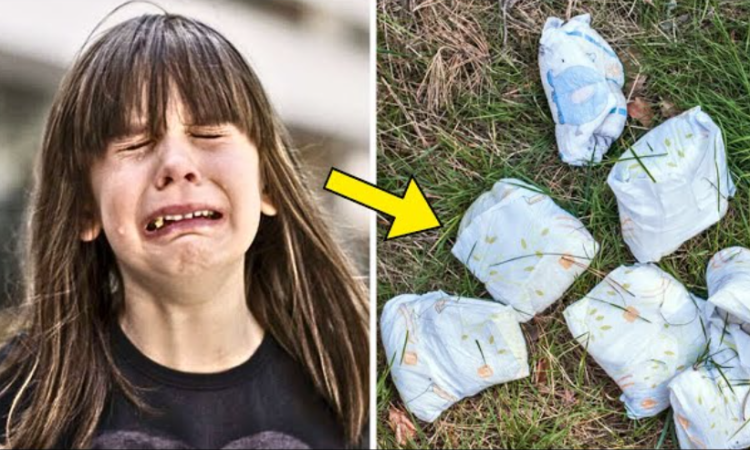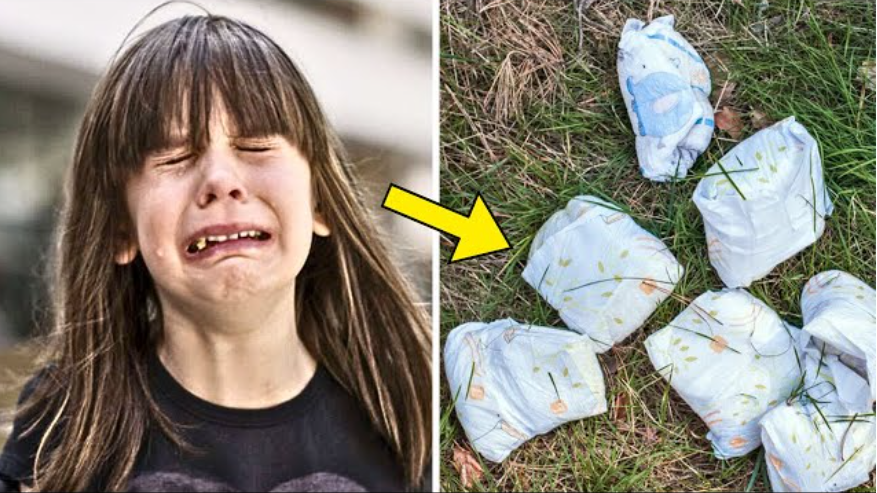Girl Ditches Used Diapers Behind School Every Day – Parents Burst Into Tears When Realizing Why

Every morning, school janitors found used diapers hidden behind the school building. The bizarre act confounded them and led to many whispers amongst the staff. When a diligent teacher decided to investigate, she was startled to discover a young girl from her own class responsible. But the reason behind her actions was far more heartbreaking than anyone had anticipated.

Fiona, one of the teachers at Silverwood High School, had heard about these mysterious diapers appearing behind the school building. She couldn’t wrap her head around why a mother would throw her used diapers there instead of in a trash can. It was just baffling, as it didn’t seem like something a mother would do. Fiona racked her brain about it daily, feeling so sorry for whoever was doing that.
Fiona didn’t know why, but she felt the urge to find whoever was ditching the diapers there and help them. So, she began to investigate. She sat her class down that same day and asked them if they had seen anything. She went about it in a kind and understanding way, hoping it would encourage someone to come forward with information.
Fiona sighed. She would have to get the truth out of Mia some other way. She couldn’t accuse her student of something like this without proof. That’s when she suddenly had an idea. She quickly grabbed her coat as she rushed out of her classroom, following Mia’s route.
When she finally saw Mia in the distance, she slowed down again. She had never done something so spontaneous before. Fiona just knew Mia was hiding something about those diapers. But what could an 11-year-old possibly do with so many diapers? She quietly walked over to the house. She couldn’t just ring the doorbell; she had to find a way to peek inside. But sadly, all the curtains were shut. There was no way Fiona would be able to see inside. This is a dead end, she sighed, and she began to walk back to school.
Once at school, she closed up her classroom, thinking about a way to get Mia to fess up. The next morning, Fiona went to school earlier than usual. She parked her car in a spot where she had a clear sight of the dumping spot and waited. Time ticked by, and she began to grow impatient. It was almost 8:00, and that was when she had to be inside her classroom setting up for the day. She had been there for 2 hours already, but there was no sign of Mia. Could Fiona have scared her off?
Fiona stood in front of her class, her gaze lingering on Mia’s empty chair. She recalled Mia’s typically quiet demeanor, how she’d sit in the back, often lost in her own thoughts during recess. Fiona watched from the staff room window. Mia was usually by herself, sitting under the old oak tree while other kids played. Today was no different. Mia’s isolation was like a silent alarm ringing loudly in Fiona’s mind. She noticed how Mia’s eyes would occasionally follow the other children—a faint longing etched on her face, quickly masked by a return to her solitary activities.
Fiona’s heart ached as she thought of Mia. Her motherly instinct, sharpened by her own journey through motherhood, resonated deeply with the unspoken troubles she sensed in Mia. Fiona discussed Mia’s situation with other teachers during their breaks. “I’ve noticed a change in Mia,” she said. The art teacher recalled Mia’s once vibrant drawings turning dull and lifeless. The music teacher noted her waning participation in class. These small yet significant changes in Mia’s demeanor over the months painted a picture of a gradual retreat into her own shell.
Arriving at Mia’s home, Fiona’s first impression was a wave of concern. The house stood worn and weary, its paint peeling, and the yard unkempt. Toys lay scattered, forgotten in the grass. This visual disarray spoke volumes, hinting at the struggles that might lie within. Fiona took a deep breath, steadying her resolve as she approached the door, her heart heavy with empathy.
Once inside, Fiona was met with a scene of stark reality. The house was cramped and poorly maintained, with signs of neglect hard to miss. The furniture was sparse and worn, the walls bore marks of time and disregard. Through a mother’s eye, Fiona noticed the glaring lack of basic necessities. The shelves were sparsely stocked, and there was a palpable sense of scarcity.
That evening, Fiona sat alone, grappling with the moral implications of her dilemma. Her heart ached for Mia, and she felt an overwhelming urge to protect her. After sleepless contemplation, Fiona reached a decision. She resolved to take a personal approach in helping Mia.
Fiona noticed Mia’s frequent yet secretive visits to the school’s daycare center. These visits were quick, often happening when Mia thought no one was watching. Fiona’s curiosity grew along with a suspicion that these observations were somehow linked to the mysterious incidents occurring around the school.
Over time, Fiona recognized consistent patterns in Mia’s behavior. These weren’t random acts but part of a routine Mia had established over several days. Fiona noticed a telling pattern: a consistent discrepancy in the diaper supplies coincided with Mia’s visits to the daycare. Though indirect, this correlation was too strong to ignore. It suggested a potential link between Mia and the missing items.
Fiona knew that understanding the full context of these occurrences was key to providing the right support. In the solitude of her classroom, Fiona reflected on her findings. She considered the implications of the patterns she had observed.
In a quiet corner of the school library, Fiona set a comforting tone. She chose a spot away from the usual hustle, somewhere peaceful. “I’m here to listen, Mia,” she reassured, offering a supportive smile as they settled in. Fiona began to gently probe into Mia’s life. “How have things been at home?” she asked softly, ensuring her questions were open-ended and non-threatening.
It was clear that Fiona’s genuine concern was having an impact. As Mia spoke, subtle hints of her burdens emerged. She mentioned being busy at home, her words laced with a hint of exhaustion. Mia’s eyes filled with tears as she explained her actions. Her words revealed a deep sense of responsibility far beyond what should be expected of someone her age. She had taken on a role that was necessitated by circumstance.
With a mix of fear and relief, Mia shared her fear of her parents discovering what she had done. She expressed worry about their reaction, not wanting to add to their stress. Fiona’s heart ached as she realized the extent of Mia’s inner turmoil.
Fiona responded with deep understanding and empathy. She acknowledged the complexity of Mia’s situation, assuring her that her feelings were valid. As Mia and her parents gathered in Fiona’s classroom, the air was tense with anticipation.
Fiona started the meeting delicately, acknowledging the sensitivity of the topic. She explained her observations and concerns in a measured tone, careful not to overwhelm Mia or her parents. The goal was to set a foundation of trust and openness from the outset of this crucial conversation.
Fiona gently unveiled the truth about Mia’s actions. She emphasized Mia’s intentions, highlighting the love and responsibility she felt towards her family. Upon learning the truth, Mia’s parents were swept by a wave of emotions. Shock was the first to surface, quickly followed by a sense of guilt for not having realized Mia’s struggles. Gratitude also emerged as they recognized the extent of their daughter’s efforts to support the family. These emotions intermingled, creating a moment of profound realization for the entire family.
Fiona took the initiative to mobilize the school and local community to offer discrete support to Mia’s family. She coordinated efforts to provide them with resources that could ease their financial burdens. This involvement was handled with respect for the family’s privacy, ensuring that the support was both effective and sensitive to their needs.
The family’s situation began to improve with the support they received. Financial counseling, donations of essential items, and emotional support from the community paved the way for a brighter future. This new beginning was marked by a sense of hope and gratitude as Mia’s family experienced the power of a community coming together to uplift one of its own.




